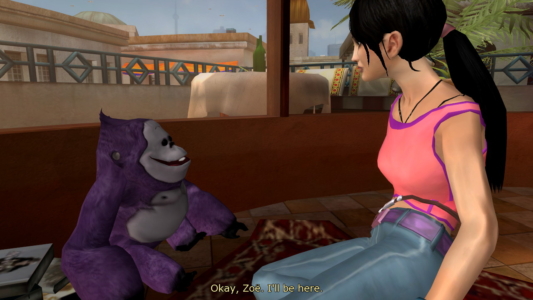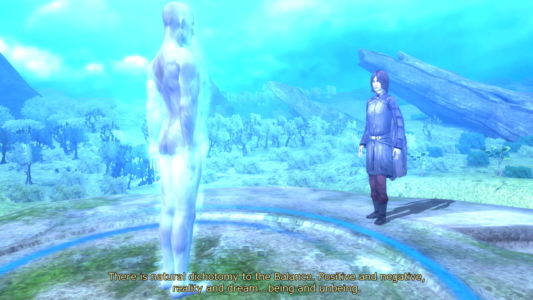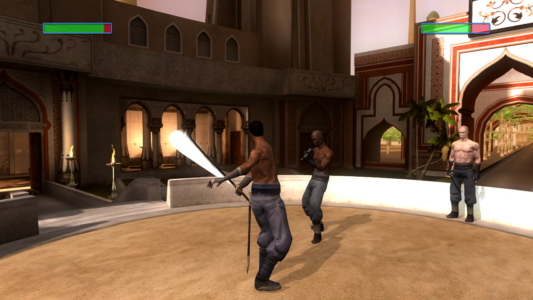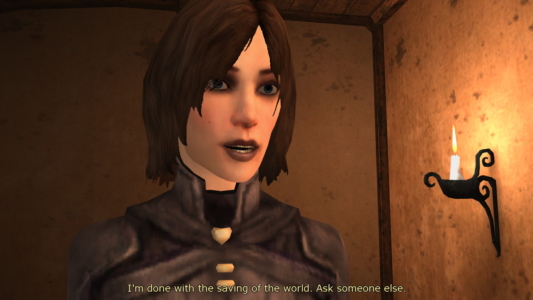
Dreamfall: The Longest Journey
Written by: Discussion
Date posted: January 21, 2016
- Genre: Adventure
- Developed by: Funcom
- Published by: Empire Interactive
- Year released: 2006
- Our score: 7
Hello everyone, here’s another of our discussion items. Today’s game is Dreamfall, sequel to the 2000 adventure The Longest Journey. The games are set across two worlds – one, Stark, is our earth in the future, based on science and technology. The other, Arcadia, is a land of fantasy and magic. Our heroine, Zoë Castillo, is a girl from Stark who stumbles into the other world whilst trying to find her missing friend. We also see the return of April Ryan, the heroine from the first game who was charged with preserving the balance between the worlds.
We’ve tried to avoid giving away any major story developments, but, there may still be spoilers in here.
A lot of talking
Stoo: So our usual starting point: why did you choose this particular game?
Rik: Heh, well, I think we’d been back and forth with a few ideas. I wanted something relatively recent, that we both owned already. I happened to know that you had this because a number of years ago I gifted it to you via Steam at Christmas, except you apparently already had it. It was sitting in my inventory for years, without me noticing.
Stoo: It was one of the first games I ever got on Steam actually, but it ended up buried in the ever-growing unplayed list and I totally forgot about it.
Rik: Since you’d already covered The Longest Journey it seemed like a decent enough idea to go for the sequel. So perhaps not the purest of rationales but hey, here we are.
Stoo: It’s good that we got around to covering this one eventually, to follow up on the original. Longest Journey is honestly a game where I feel it should have made more of an impression on me than it did.
Rik: I was reading your review, seemed fairly positive?
Stoo: It was a good adventure, but I realised I’d forgotten an awful lot of what happened.
Rik: I guess it was a few years ago! From what I understand it was a pretty long game (part of the reason I wasn’t tempted to go back and play it first).
Stoo: This sort of richly detailed fantasy story really should be my sort of thing. I think got a bit lost towards the end in a blur of talk about Guardians and Balance between worlds, and too much long-winded exposition. There was a LOT of talking. Like there is here, but we’ll get to that.
Post golden-age adventuring
Stoo: I suppose with Dreamfall the first thing to note here the change of genre.
Rik: It isn’t a point and clicker, which I guess was out of fashion at the time. Although arguably it was already at the time of TLJ.
Stoo: Right. The classic point-and-click adventure was already dying off by 2000.
Rik: In my (extremely hazy) memory of adventure game history, I have TLJ as one of the last ones of note covered in the UK games press. Alongside the dreadful (and unintentionally hilarious) The Mystery of the Druids.
Stoo: I guess Ragnar Tørnquist (note: director of the Longest Journey series) decided it was time to modernise. So we have instead a third person action-adventure.
Rik: Yes, although it’s not exactly Tomb Raider.
Stoo: It’s trying to incorporate elements of those more action-oriented games whilst still being an adventure.
Rik: There’s a bit at the beginning where you have to go to the gym to practice fighting and I thought ‘Oh crumbs’, but actually there wasn’t as much of that stuff as I was expecting.
Stoo: The combat is pretty clunky. I found myself just mashing the attack buttons. Maybe timing or more refined tactics helps beat enemies quicker, but I never really had the need.
Rik: I sort of don’t mind action interludes as long as they’re not clunky AND hard. The thing you sort of dread is something like The Nomad Soul (which has obviously been in the news a lot recently because of the Bowie connection). The ones in Dreamfall aren’t too bad.
Stoo: Combat here isn’t too tough. I don’t think I failed any more than once.
Rik: My approach was, like you, to impatiently hack at the attack button, and then if it didn’t work be slightly more cautious. The other action-y bits are the stealth sections.
Stoo: Those are a bit half-assed. Rather simplistic, although I guess at least they’re not frustrating on top of that.
Rik: What you have to do is all heavily signposted, either through cut-scene clues or another character just saying ‘You need to hide here’.
Stoo: Yeah it’s pretty obvious it’s Stealth Time, when you’ve got to say get past a bunch of security bots.
Rik: I am famously awful at stealth bits but these were all fine for me. To be fair, they’re implemented in a way that they’re simple without being laughable – i.e. if you do break the rules you will die. I’m thinking of an FPS or something where it’s meant to be all about stealth and then you clomp right up to a bad guy and he doesn’t notice. There’s nothing like that. It’s all enough to create moderate tension, without getting too bogged down in the mechanics.
Stoo: Maybe I’m being unduly critical then. It’s some variety at least.
Rik: I guess if you like stealth you might be disappointed in the implementation. If you don’t, you might be relieved. For me, there was just enough to create a change in atmosphere from the bits where you’re obviously wandering around in an adventure doing whatever you want in a carefree fashion, to let you know that you’re behind enemy lines and you need to be cautious. People are critical of these bits in adventures. But as long as they’re executed in a light-touch way, I don’t mind them. (Mind you, I’d also be happy to defend QTEs! Which is for another time perhaps).
Stoo: That’s a more constructive way of looking at it. Bringing a change of pace without bringing the player – who might not usually be into this sort of thing – to a total halt.
Chatting and running errands
Stoo: Onto the adventuring side…There seems to be a lot more talking and running around, than puzzle solving.
Rik: Yes. A lot of talking. There was one section where it seemed like it was literally just going from place to place and then the person you talk to saying “Oh no, I can’t help you with that, but I know who can…”
Stoo: There are a few places where you literally do nothing but run along a path and have a conversation with the person at the end. I’m thinking of that Dark People library, and the white dragon lady (who I’ve a nagging feeling I should remember from the first game). Also some parts where you’re carrying out more actions but it still amounts mostly to running, particularly like in Marcuria.
Rik: Yep, that’s what I was thinking of. (Marcuria is the olde-worlde place, right?)
Stoo: Yes, the town in Arcadia (fantasy world).
Rik: There’s a bit where you have to bribe a tramp for help, and then he can’t help you but sends you somewhere else, and then that person needs something, but can’t help you, and sends you to someone else, who needs their pet rescuing. And so on.
Stoo: Right. There’s not really a lot of mental challenge to that section, it’s just run to one person, talk to them, to find what they want, then go to the next.
Rik: I’m not a great fan of complicated puzzles but even I was thinking, this is a bit straightforward.
Stoo: There’s very little traditional puzzle solving here. Even if you ever have to use items, they’re immediately to hand in the area around you.
Rik: I found that if there was ever a bit where you had to be a bit clever, you were a bit out of practice at thinking. For example, there’s a ‘focus’ skill that you’re introduced to early on, where you can interact with something from far away. Then hours later you actually need to use it and you’ve forgotten you even have that ability.
Stoo: We mentioned stealth being simple, but I think the bit that taxed me the most was actually based around timing sneaking past some monsters, when controlling April in those ruins under Marcuria. That took a little thinking.
Rik: That was easily my least favourite bit, although it wasn’t so much the monster avoiding as the getting lost. My impatience made me get caught by the monster. At one point I was shouting “Where is that hole I just crawled through? I was literally just there!”
Stoo: There are a bunch of samey looking corridors which doesn’t help. As for any puzzles based on interaction with the environment, as opposed to monster-avoiding, I can’t think of much that was a real challenge to figure out.
Rik: No. But I don’t mind that too much. There might be people who pine for the really tough days of obscure puzzles but I’m not one of them.
Zoë’s Tale
Rik: The toughest part for me was figuring out what was going on at times. And I don’t think it was because I hadn’t played TLJ.
Stoo: You don’t really need to know the first game in great detail. Game 1 was all about the Balance between worlds, and at one point you actually visit the Guardian who basically says “nah the Balance isn’t a problem today”. The plot this time involves a bunch of new elements. So if you’re a bit lost as to what’s going on, that’s a problem with the narrative not being sufficiently clear.
Rik: I guess I was quite getting into the Zoë story and then when it went to April it seemed to lose momentum.
Stoo: I liked Zoë’s personal story but all that stuff about dreaming technology lost me a bit. If I followed right there are two issues going on at once? Shady Corproration WATI making lucid dreaming tech which could be used to nefarious ends, but also the Creepy Girl causing problems in the system in the dream computers and/or also their Future Internet (referred to as The Wire). But then what’s going on with that weird fat guy monster guy?
Rik: Not sure. He was BAD for some reason. I don’t want to get into spoilers too much. Although I’m not sure I could spoil it if I wanted to! My general feeling was that as the game progressed I felt less confident that all the different threads were going to come together. In fact, more elements seemed to be introduced. I didn’t feel the ending had much of an impact on me.
Stoo: Well it’s not so much an ending, as an abrupt halt on a bunch of cliffhangers.
Rik: By the end I think I’d forgotten the beginning. BUT! I feel like we’re both being quite negative here but there were lots of things I liked.
Stoo: Same here. Such as the three protagonists. Each has their own personal journey, and I found myself wanting to see what happened next to each of them.
Rik: Zoë’s is the main one and the one I enjoyed the most.
Stoo: Yeah Zoë is front and centre, the aimless college dropout who has the unexpected strength to go through all this weirdness for the sake of her friend.
Rik: There’s a definite sense of melancholy in those opening bits, an unusual start. Particularly as our protagonist doesn’t suddenly become heroic in the traditional sense.
Stoo: That’s a good observation. Despite all the sunny view of Casablanca it feels a bit sad.
Rik: Feeling hopeless in your early twenties is certainly something I remember, but I liked the way Zoë’s courage feels very real. It’s not like George Stobbart’s “I just got nearly blown up by a bomb so I guess I’ll find out who did it”. There is a subtlety in the writing I think. Is there any similarity between Zoë in this game and April in TLJ? I get the impression April in Dreamfall isn’t the April you know from the first game.
Stoo: There’s some overlap in their respective situations. In TLJ April is a student who stumbles into being a hero who can teleport between the two worlds. Although her personality is a bit different, she’s actually fairly chirpy. Which contrasts with her more cynical, resigned nature in this game. (Disclaimer: I may not be remembering perfectly).
Rik: Returning characters was the only bit where not having played TLJ left me at a disadvantage. You’re obviously given an explanation so you’re not completely in the dark. But I didn’t know how much of a cheer I should be giving some of them. Were Brian and The Crow big players in the first one?
Stoo: Crow was a fairly important sidekick, and I was glad to see him again. He has some of the best lines, in that upbeat American way of his.
Rik: Crow could have been so very annoying but I think he stayed just on the right side of things in that regard. Just.
Stoo: Brian, I totally don’t remember. I think he had some key importance to the plot. I didn’t follow what was happening with him in Dreamfall’s intro, incidentally (note, so there’s actually four protagonists, although you don’t spend long on Brian). I think that scene in Tibet is showing how he first visited Arcadia, but then he meets the same weirdly ominous guy we see in the game’s ending, and I’m lost as to what’s going on there.
Rik: Oh good. Not just me then. Brian didn’t seem that important to me so I figured he must have had some key role in the first game. Incidentally, while I found the quality of the dialogue writing and acting pretty high overall, I did pause when the American characters said the word ‘bloody’. It didn’t strike me as something they say over the pond. Like when Brian exclaims, “APRIL BLOODY RYAN!” Can you advise?
Stoo: I could double check with the wife but, no, I don’t think they’re regular users of the word.
Rik: US readers do let us know!
Stoo: My one acting complaint was that yellow and blue lady who’s part of April’s resistance movement.
Rik: Yes, Cat lady.
Stoo: She’s dreadful, she speaks her lines with all the passion of reading a shopping list. Everyone else is competent at least.
Rik: I liked the healthy mix of English, Scottish and Irish accents.
Stoo: A lot of the Azadi are Irish, I noticed. They all seem pretty authentic.
Rik: He’s only in it briefly but I liked the Scottish fighting instructor. “YOU’RE LIKE TWO LOVERS OUT FOR A STROLL IN THE MOONLIGHT! FIGHT, DON’T DANCE!”
Stoo: Speaking of Azadi, what did you think of Kian (the third protagonist)?
Rik: I didn’t know what to make of him really. He’s introduced as a bit of hard bastard but everyone thinks he’s a bit soft underneath. We don’t really get very far in his story.
Stoo: I thought it was an interesting move to give us a perspective from the bad guys. He genuinely thinks he’s fighting for a good cause, bringing peace and order to the world.
Rik: One minute you’re fighting Azadi, the next you’re swording rebels.
Stoo: One of the most memorable bit of dialogue is when he and April argue their respective points of view. It’s a classic clash between values of Freedom and Security.
Rik: Were the Azadi in the last game?
Stoo: Not that I recall.
Rik: The Azadi aren’t exactly your classic bad guys. They haven’t raped and pillaged. Some people in Arcadia like them…
Stoo: They’re authoritarian and oppress non-humans, but they saved the city from barbarians. For humans, life under their rule is actually pretty good in some ways.
Rik: They bring technology. Like a lovely beer pump for the pub!
Stoo: Also airships, which are basically now obligatory in any fantasy-meets-tech setting.
Rik: Yes. I have to say Dreamfall combines two of my least favourite settings, fantasy and twee sci-fi. But somehow it manages to stay on the right side of acceptable. I noted each and every errant use of a Y. “Fyre charm”, “Chymical spell” Etc. I’m sure the sci-fi has some unacceptable apostrophes in the middle of names, too, and I was groaning a little at the talking monkey telephone but I went with it. [Edit: Zoë has a purple monkey thing called Wonkers who kind of acts as a personal organiser.]
Stoo: Oh I kind of liked the monkey guy. I must be a sap!
Rik: I didn’t mind the character, just the concept.
Stoo: I actually put his CPU back in before finishing that section, which I don’t think is required.
Rik: Whoops! No I didn’t do that. Perhaps that says something about our respective attitudes towards him.
Stoo: I think maybe because, as you noted, the opening is oddly melancholy, and monkey guy represents childhood happiness for Zoë. So I wanted monkey guy to be okay.
Rik: For me, she was leaving it all behind once things started to go wrong. I like there are those optional bits though. There’s more than one way to approach some puzzles. For example when you go to the WATI museum, I was obsessed with the possibility of getting the museum ticket from the man who was waiting for his girlfriend through clever dialogue choices. Which isn’t possible, but there are a couple of ways to do that bit. I was curious enough to go back and try a few different approaches.
Stoo: If I recall right, I somehow got him to give up and throw away his ticket.
Rik: Well I don’t think you can stop him ripping it up but there are a couple of ways to get in after that.
Stoo: I just looked it up, you can either stick the ticket back together or wait for the guy’s girlfriend to show up and give you hers. Elsewhere in the game, there are a couple of bits where you can try sneaking or fighting. Like those goblin things when Zoë first arrives at Arcadia.
Rik: Yep. I beat the crap out of them (like a coward).
Stoo: Also that guy in the slum building with the dreamers in Newport.
Rik: Think I managed to sneak past him.
Flawed but worthwhile
Stoo: Okay so we should try and tie this all together. We’ve pointed at a bunch of flaws, but I found I had fairly positive impressions of Dreamfall in total.
Rik: Yes me too. I liked lots of bits about the story and the writing. Even if it didn’t all hang together. I felt like it might also benefit from a second playthrough. Perhaps the story might have been hard to follow because it was a bit more subtle and multi-layered than your typical game plot. It’s definitely smarter than your average game.
Stoo: There’s more depth to the story, and several plot lines intertwining.
Rik: For me it was an enjoyable adventure. As mentioned, I think the action bits are fair enough. It’s a million miles better than some of the point and click dross of the mid-00s. e.g. The Moment of Silence.
Stoo: That’s interesting. I guess point and click was in a slump at that point, since the big names had given up.
Rik: I’d probably put it in the same category of the next generation of adventures, along with Beyond Good and Evil, Fahrenheit etc. Also the third and fourth Broken Sword games, although I’d say this was more successful than either of those.
Stoo: I felt that Dreamfall was the sort of game where the main reason to be there is to experience the story. There’s just enough challenge to hold it above “walking simulator” level (to use a derogatory term aimed at some indie adventures). I would have liked to spend a bit more time solving puzzles, rather than walking down another corridor for another lengthy session of dialogue. But I have to admit, as someone with limited gaming time, I’m kind of happy I never got bogged down on convoluted puzzles or genuinely hard combat at any point.
Rik: Yes, fair point. Slightly off topic – did you play with a gamepad?
Stoo: I played with mouse, and it has the weirdest effect. I’ve heard of mouse acceleration but this seems to be decelaration? Move it faster and you turn slower.
Rik: Well it was just with you mentioning the phrase ‘walking simulator’. I noticed that it has analogue walking speed – i.e. push the stick slightly for walking, more to run. Perhaps this is a common feature of modern games! But I’ve only just got into using the Xbox 360 controller on the PC…
Stoo: I keep trying to but I’m diehard kb+m for life. Too set in my ways.
Rik: Me too, if there’s shooting involved.
Stoo: I do feel like I want to play the next sequel, Chapters, just to see what happens next to the characters.
Rik: Funny you should say that. I bought it with Steam Wallet vouchers I got for Christmas, immediately after finishing. I’d have hated to wait nearly 10 years like those who played it at the time!
Stoo: The cliffhanger is fairly brutal and wraps up one thread but leaves a lot hanging. Which is maybe not the right way to go if you’re going to take so long to produce a sequel.
Rik: I guess I don’t really know the reasons why it took so long. I think they had to use Kickstarter for Chapters?
Stoo: That seems to be how it’s done these days. Any other points you’d like to raise?
Rik: I thought Zoë’s accent was going to annoy me. It was that Radio 4 play/Helen Baxendale in Friends type English accent. Which I think I have a mental block about. It sounds fake English even though it isn’t. Anyway, I soon got over it as I warmed to the character. The other thing was the musical interludes here and there, i.e. pop music coming in, as if it was a film, but not as often as in a film. It struck me as a bit odd.
Stoo: They felt a bit mawkish and un-necessary to me.
Rik: Possibly it’s a method that needed to be introduced earlier in the game for it to make sense. Otherwise it’s just a couple of bits where some pop music plays randomly. I thought it worthy of comment because it’s not often used in games. Or at least wasn’t up to this point.
Stoo: That’s true. Any sort of music with vocals is rare. (scratching head for an example…Vampire Bloodlines, although it only comes up when you visit nightclubs, eg a suitable context).
Rik: That was it though really. What about overall score? I’d give it a solid 7.
Stoo: That was my thinking also! As a game it’s a bit lacking. As a story it gets a little confusing in places, but it has some strong elements too so overall it’s among the better examples in gaming. Familiarity with the original helps, but isn’t necessary.






 Posts
Posts
As a Canadian, “bloody” isn’t a term that is seldom used. Doesn’t mean I don’t like to throw around the ol’ “bloody hell” in between the more popular swears used.
May 10, 2023 @ 9:30 pm